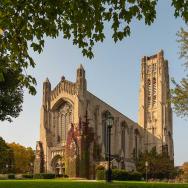Agnes Callard doesn’t only study and teach philosophy—she lives it. Whether debating a friend over dinner, leading a late-night discussion in Hyde Park, or questioning her own beliefs in print, she treats inquiry as an open-ended pursuit rather than a search for fixed truths.
A philosopher of ancient thought and modern dilemmas, the associate professor at the University of Chicago is known for her commitment to intellectually challenging herself and others—often in public.
In her latest book, Open Socrates: The Case for a Philosophical Life, Callard explores why inquiry—not certainty—is at the heart of philosophy. Her work is both deeply personal and inherently Socratic, often questioning what we think we know about choice, morality, and whether philosophy should provide answers or simply ask better questions.
In the following Q&A, Callard delves into the themes of Open Socrates and why, for her, philosophy is not just something we can study—it’s something we can live with.
What is your advice for balancing ‘untimely questions,’ deep, existential inquiries, with the practical, day-to-day demands of living?
The issue isn’t about balancing philosophy with daily life, as if we sometimes overindulge in deep thought and neglect practical concerns. Rather, we use urgency as an excuse to avoid these questions entirely. The real challenge is not how to balance them, but how to make space for them.
The best way to start is by finding openings in the conversations we’re already having. My hope is that after reading my book, people will be better at spotting these opportunities. Our daily conversations are less predetermined than we think—we make unnoticed choices, like avoiding follow-up questions or falling into the habit of simply exchanging stories. But we don’t have to limit ourselves to that.
It’s a bit like when I first got pregnant with my oldest child. Suddenly, I started noticing pregnant women everywhere—not because the world changed, but because my awareness did.
You’ve long explored inquiry—even as a student asking strangers philosophical questions at the Art Institute. How have your questions evolved over time? Has the way you ask a question changed?
It’s not just how you ask a question but also the circumstance in which you ask it. As a college senior, I wanted to be Socrates and approached people at the Art Institute, which to me was the Chicago analog of the Athenian agora, for philosophical conversations—and it did not go well. People were put off, unsure of my intent, as if I was trying to sell them something they didn’t know. Now, I engage more people through public writing, events, and teaching, where questioning is expected. It helps if people come to you. I’ve learned to identify and articulate the questions already emerging in a discussion. Teaching mirrors this process—I sense where a conversation is headed and make implicit questions explicit.
How has Socrates influenced your research and teaching?
Socrates instilled in me an inquisitive outlook. I don’t see myself at the end of inquiry but always in the process, making me open to challenge. If someone shows me I’m wrong, that’s an improvement.
Students can tell when a question is merely pedagogical versus one their teacher is genuinely curious about. So, when I present a question in class, it has to interest me as well. For instance, when discussing A Raisin in the Sun, the following question emerged from the discussion and I made it explicit: Do you discover a person’s true nature in good or bad circumstances? That’s how Socrates influences my teaching.
Research works the same way—it’s inherently inquisitive. Much of my research is conversational, shaped by presenting talks, receiving objections and refining ideas. Because I can’t see beyond my own perspective, I rely on others to challenge and expand it.
You write that Socrates believed humans struggle most with politics, love and death. Thinking about politics, how do you persuade people to talk with each other and be more open-minded?
If people won’t talk to each other, they can’t be open-minded. Instead of trying to get people to talk to each other, persuade them to talk to you. The way to do that is by figuring out what you can learn from them—then genuinely trying to learn it.
Many assume persuading someone to be open-minded means teaching them something. But it’s more about learning from them. If you don’t have something to learn from someone, why engage with them at all? Socratic inquiry is about extracting knowledge from other people around you, and over the course of that extraction procedure, you might end up showing the other person that they’re wrong about something, Socrates often did this.
The real problem isn’t other people—it’s you. Instead of asking, “How do I fix them?” ask, “How do I fix myself?” That’s the Socratic lesson.
Are there important questions we’re not asking enough within higher education or at UChicago?
A pressing question is: How can we make the university a place for serious leisure rather than a hub of competitiveness? Universities should offer a refuge from real-world pressures, allowing students and faculty to explore fundamental questions. However, over time, both have become consumed by urgency and external demands.
Students often feel compelled to approach education pragmatically—How will this look on my transcript? Will this help my career?—not necessarily by choice, but because they’ve been conditioned to think this way. UChicago’s acceptance rate is currently 4.5%. As universities have gained prestige, they have also absorbed external pressures that make genuine inquiry more difficult.
A university isn’t a vacation, but as Aristotle described, serious leisure is essential—a space distinct from both work and relaxation, where deep intellectual reflection can take place. The challenge is ensuring that space can be preserved.
—Adapted from a story originally posted on the UChicago Division of Humanities website.

